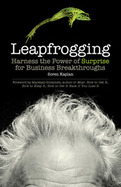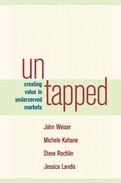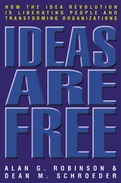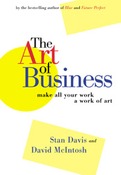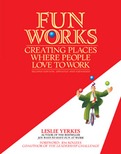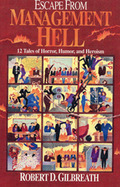2012
In his trailblazing debut, Kaplan gives business leaders the tools to do exactly what they're taught to avoid: embrace surprise-the new key to business innovation.
-
Challenges the idea that business success requires leaders to create predictability and maximize control
-
Demonstrates how embracing, cultivating, and harnessing uncertainty and unexpected events can inspire breakthroughs in all areas of business
- Filled with real-world examples of what companies such as Intuit, Gatorade, Four Seasons, and Colgate have achieved through the power of surprise
- Winner of the Bronze Axiom award in the category of leadership
How did Gatorade revitalize itself in the wake of Red Bull and Starbucks? How did Etsy come to be? What makes one company or brand thrive while others languish in today's fast-paced, ever-changing marketplace? There's no doubt hard work is involved, but Soren Kaplan shows you can't do it by simply creating a big vision and implementing a set plan. In his trailblazing debut, Kaplan gives business leaders the tools to do exactly what they're taught to avoid: embrace surprise -- the new key to business innovation.
For Kaplan, breakthrough success is all about "leapfrogging." Instead of fighting against uncertainty, Kaplan reveals how to use it to break down limiting mindsets and barriers to change the game. Using his LEAPS process (Listen, Explore, Act, Persist, and Seize), leaders learn to recognize and harness surprising experiences and events as a way to create solutions that leap beyond the current expectations of customers, partners, employees, and the competition. By highlighting specific ways to transform both good and bad surprises into unique opportunities, Kaplan encourages leaders to compete by embracing counterintuitive ideas, managing paradoxes, and even welcoming failure.
Now is the time to challenge assumptions and reinvent what is possible. All organizations -- from large corporations to those just starting out -- have the potential to take a significant leap forward by turning today's increasingly uncertain environment into a tool for unprecedented success. Kaplan's Leapfrogging is the new handbook for the modern leader.
2006
Tapping underserved markets for consumers, employees, or suppliers is not a new idea in business. When Henry Ford founded the Ford Motor Company in 1903, he proclaimed, "I will build a car for the great multitude." Ford understood that the real profits to be had in the auto business were not in selling luxury items to the well-to-do, but in providing essential transportation for ordinary folks. To achieve this goal, he both changed manufacturing processes to lower production costs, and also doubled his workers' wages to enable them to buy cars--creating the phenomenal success of the Model T. Today, businesses have the opportunity to increase profits and improve underserved communities by selling to them, and hiring and purchasing from them. While previous books have touted business opportunities in these underserved markets, none have outlined the specific strategies necessary to turn this business concept into a detailed business model. Until now.
Based on extensive research and featuring fifty case studies from leading corporations--including IBM, JPMorgan Chase, and Dreamworks--Untapped details the practical dos and don'ts every manager needs to know when approaching a new market. It shows how, by engaging consumers, workers, and suppliers, companies can create win-win partnerships with underserved communities. Corporations will discover a new source of increased sales, qualified workers, and marketable innovations as well as new ways to reduce costs and increase quality. The communities will get better products, more meaningful job opportunities, and an increased market for their own goods and services.
Organized around five key success factors the authors identified during their study of pioneering corporations, this innovative book clearly outlines how to establish the kinds of win-win partnerships that are vital to succeeding in these complex but potentially rewarding markets. Combining practical tools, case studies, and careful analysis, Untapped provides concrete guidance for investing in and partnering with underserved communities to create not only significant competitive advantages but also vibrant communities in which to live, work, and do business.
- Offers detailed, tested, practical advice to help corporations increase sales, recruit qualified workers, spur innovation, reduce costs, and improve quality by working with overlooked low-income communities
- Shows how to structure these relationships so that they are beneficial for both the communities and the corporations
- Features over fifty case studies from leading corporations, including IBM, JPMorgan Chase, and HP
2006
From simple ideas for saving time, effort, and money, to entirely new ways of doing business, front-line employees see a great many opportunities in their day-to-day work that their managers don't. Drawing on extensive research and experience in more than 300 organizations around the world—and including numerous illustrative examples—Alan Robinson and Dean Schroeder show precisely how to take advantage of the virtually free, perpetually renewable resource of employee ideas. Ideas Are Free shows managers how to tap all the ideas their employees have and gain significant advantage over their competitors.
- Outlines how to set up a truly effective system for soliciting, evaluating and implementing employee ideas for improvement --- a proven, low-cost source of potentially millions of dollars worth of added savings and revenue, and improved procedures and processes
- Shows why existing systems, such as the hopelessly antiquated "suggestion box", fall far short of the mark
- By the bestselling author of Corporate Creativity --- more than 40,000 copies sold
2005
In the traditional model, business operates in an economic flow of inputs
(resources and raw materials), outputs (products and services) and processes that help get you from one to the other (research and development, production, distribution). Davis and McIntosh show that artistic flow operates the same way, but with inputs that include things like emotion, imagination, and intuition; and outputs that include things like beauty, meaning, excitement, and enjoyment. Step by step, Davis and McIntosh show how you and your company can blend the two flows, interweaving them to achieve both success and fulfillment in everything you do.
By blending the aesthetic and emotional richness of the arts with the strategic and operational perspectives of business, you'll begin to see texture where everybody else is seeing shapes. You'll see colors where others see only grays. You'll see not just what is, but also what can be.
- Stan Davis is author of the bestselling books BLUR (more than 250,000 copies sold), 2020 Vision (more than 100,000 copies sold), and Future Perfect (more than 100,000 copies sold)
- Shows how bringing an artistic sensibility to business can improve business performance and increase personal work satisfaction
- Includes detailed, practical advice for implementing the ideas in the book, as well as a wealth of real-world examples
2007
- Proves that organizations can use fun to increase employee and customer retention, motivate individuals and teams, and improve overall productivity
- Completely revised and updated to show how the companies profiled in the first edition have continued to thrive by combining fun and work
- From the coauthor of the bestselling book on fun in the workplace, 301 Ways to Have Fun at Work (75,000 copies sold)
As the story opens one snowy afternoon, a commuter jet carrying twelve executives fresh from an exclusive "leadership conference" crashes in the mountains near a Colorado ski resort. Out of the wreckage stagger the twelve VIP's, suddenly finding themselves chained together. Scattered among them are real estate speculators, airline tycoons, CFO's, backstabbers, frauds, yes-men, influence peddlers, liars, and double-crossers. Orange and red lights jump and flash to their sides. Hissing sounds like ventilated steam sigh from the cavernous roof. Decay is in the air. And death. And doom. Despair comes once they realize where they are. And why. And what it will take to escape.
They are in Management Hell, facing Satan's Chief Operating Officer, Reflecto, who lays down the rules: "You know budgets and prices and costs. You know chains of command and spans of control. You know how to put a positive spin on a disastrous project, how to doll up an annual report to make a stupid investment seem brilliant! But you are here because you lack management wisdom! Your shortsightedness, your greed, your well-intentioned management styles and your tried and true techniques just don't cut it anymore!
"To escape, to leave this inferno, you must amuse me and my boss. Each in a different way. You must teach us of your errors and triumphs, enlighten our feeble devil minds, if you will. You must impart management wisdom to us.
"You must compose meaningful, entertaining, perhaps even amusing stories. Stories that demonstrate the folly and futility of your individual sins! Stories that repudiate your errors. If every story pleases Satan, if he learns enduring lessons from each, you shall all be allowed to leave. That is how you escape from Management Hell!"
Management Hell looks a lot like the organizations that people work in today. It's a place of rapidly increasing demands on productivity, fewer resources, and greater ethical dilemmas than ever before. Robert Gilbreath offers readers a way to escape this hellish territory. Twelve tales of horror, humor, and heroism help us make sense of the madness of modern management and to find our way out of age-old managerial dilemmas.
Gilbreath's premise-twelve modern executives marooned in hell, faced with the task of defending themselves to the devil by telling stories that expose the folly of their business practices-allows readers to step back from their normal daily grind and to see startling new perspectives that they may have been missing. The stories are set in exotic places-from ancient Rome to Easter Island-yet the characters and predicaments are familiar to everyone in business and management today.
These fascinating fables reflect encounters familiar to everyone in business and shatter common myths about innovation, leadership, control, and consensus building. Managers at every level can use the insights to transform the hell of modern management into resources for creativity, courage, and lasting change.
In twelve engaging stories, modern executives marooned in hell face the task of defending themselves to the devil by telling stories exposing the folly of their business practices. These stories offer readers a way to escape the hellish territory of today's organizations, and make sense of the madness of modern management.


